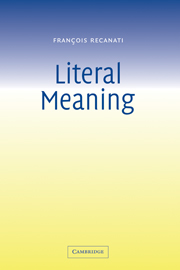Book contents
- Frontmatter
- Contents
- Acknowledgments
- Introduction
- 1 Two approaches to ‘what is said’
- 2 Primary pragmatic processes
- 3 Relevance-theoretic objections
- 4 The Syncretic View
- 5 Non-literal uses
- 6 From Literalism to Contextualism
- 7 Indexicalism and the Binding Fallacy
- 8 Circumstances of evaluation
- 9 Contextualism: how far can we go?
- Conclusion
- Bibliography
- Index
5 - Non-literal uses
Published online by Cambridge University Press: 08 January 2010
- Frontmatter
- Contents
- Acknowledgments
- Introduction
- 1 Two approaches to ‘what is said’
- 2 Primary pragmatic processes
- 3 Relevance-theoretic objections
- 4 The Syncretic View
- 5 Non-literal uses
- 6 From Literalism to Contextualism
- 7 Indexicalism and the Binding Fallacy
- 8 Circumstances of evaluation
- 9 Contextualism: how far can we go?
- Conclusion
- Bibliography
- Index
Summary
It may be thought that the pragmatic approach to what is said advocated in the first four chapters of this book blurs the commonsensical distinction between what is (literally) said and what is non-literally conveyed. What is said, in the pragmatic sense, already incorporates the derived, non-literal values resulting from primary pragmatic processes of the optional variety. Is there still room for a contrast between literal and non-literal speech? Wilson and Sperber think this distinction belongs to folk-linguistics and must be repudiated. In this chapter, however, I will attempt to show that the ordinary, folk-theoretical notion of non-literal use can be rescued. It corresponds to a range of phenomena which constitute a natural class, from a phenomenological point of view.
Non-literal uses as non-minimal departures from literal meaning
Let us start with a sense of the phrase ‘literal meaning’ which is reasonably clear and raises no particular problem. In that sense, the literal meaning of a linguistic expression is its conventional meaning: the meaning it has in virtue of the conventions which are constitutive of the language. Thus understood literal meaning is a property of the expression-type; for it is the expression-type which the conventions of the language endow with a particular meaning. Literal meaning, in that sense, I will dub ‘t-literal meaning’ (with ‘t’ standing for ‘type’), in order to distinguish the sense just introduced from other possible senses of the phrase ‘literal meaning’.
- Type
- Chapter
- Information
- Literal Meaning , pp. 68 - 82Publisher: Cambridge University PressPrint publication year: 2003



